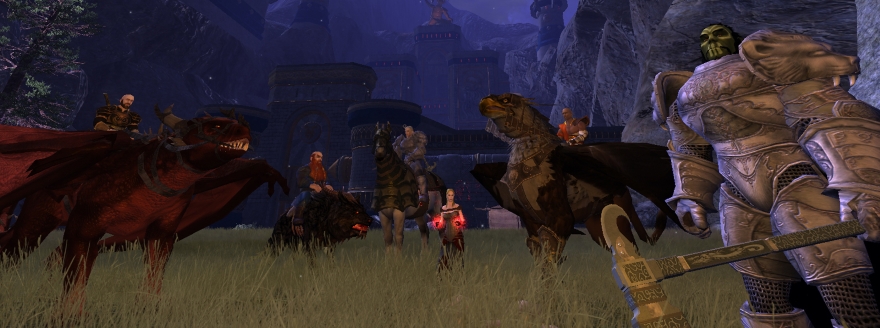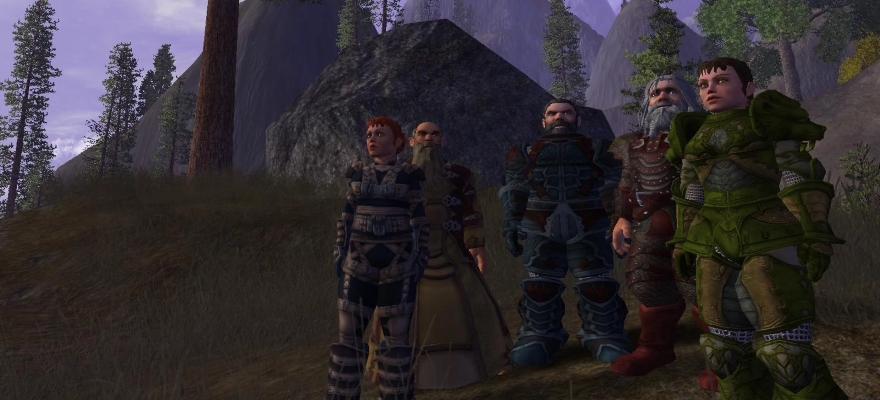
The significance of Vanguard’s development, release, long-running drama, second chance, and eventual closure should be of great interest not just to game historians but to everyone who plays MMOs, period. What happened with this game caused a huge fallout in the industry, and we are still feeling some of its effects even today.
As our own Bree once put it in her blog, “Vanguard’s implosion was a big deal at the time and marked the beginning of the post-World of Warcraft destruction of the industry that hobbled Age of Conan and Warhammer Online a few years later.”
While the crash and burn of Vanguard was a very well-known tale several years ago, I’m wondering if today there might be many who are quite unfamiliar with what happened to this unassuming title back around 2007. Let me put on my old fogey glasses and we shall begin!

Enforcing the Vision
Brad McQuaid, a longtime MUD player and designer, was brought on board with Verant Interactive (later SOE) to work on EverQuest in the mid-1990s. He was best-known for his alias Aradune Mithara (a name which McQuaid clings to even today) as well as being part of a famous EverQuest guild called Fires of Heaven.
McQuaid worked his way up to the position of lead designer of EverQuest, where he enforced his capital-V Vision for the popular new MMO. His star was so on the rise, in fact, that a 2000 issue of PC Gamer listed him as one of “the new game gods” alongside American McGee and Stevie Case.
After becoming one of the top executives at SOE, McQuaid and fellow EverQuest alum Jeff Butler left in 2002 to found their own studio and make their own MMO. With Sigil Games established, the fledgling team turned their focus on making Vanguard: Saga of Heroes.
In 2003, McQuaid announced to the public that he had assembled a “dream team” to make an incredible MMO that would top his previous project: “Well, really, it’s going to be the next big thing. We have EverQuest behind us, the most popular MMO in North America, and we have to at minimum one-up ourselves. Honestly, nobody in the all-star team that is Sigil would or could be satisfied with anything less.”
The Vision that drove McQuaid’s design decisions at EverQuest found a new home in this project. He had grand plans for the type of game Vanguard would become: an MMO that went back to MUD roots while learning from the current crop of games, had truly massive crafting and open-world housing systems, a dynamic weather system, a huge world, public dungeons, an innovative diplomacy system, and somewhat of a hardcore attitude. The team figured that there was a large segment of gamers that were dissatisfied with the increasingly casual-pandering environment in MMOs and wanted to go back to an era when time, effort, and consequences had meaning.
Sigil signed on with Microsoft in 2002 to be a co-publisher, although later McQuaid said it was a mistake not to get all of the details of the agreement regarding the project between the two companies in writing. Microsoft went on to fund Vanguard to the tune of $30M to $40M, a considerable sum for an MMO even today.
Microsoft became increasingly skittish about the development of Vanguard following a “regime change” in 2004, requesting more demos and milestones as time went by. Over the next couple of years, the two companies bickered, pointed fingers, made demands, and sowed sour grapes as competing (small-v) visions for the game became too different.
It also certainly didn’t help that McQuaid and other Vanguard devs ignored the rising star of World of Warcraft, dismissing it in conversations and never playing it in person. Other red flags started to pop up, such as the leadership refusing to allow the team to create scripting language and other necessary tools for the game.
By 2006’s E3, Sigil Games had developed a strong following and a salivating press corps giving wind to the hype surrounding Vanguard. The team talked up how it had seven years of content already planned for the game, leading some publications to speculate whether the game might be “a true threat” to the behemoth of World of Warcraft.

A black day
Meanwhile, tensions came to a boiling point between Sigil and Microsoft. According to McQuaid, the latter was losing a desire to create an MMO at all, especially one that wasn’t a clear carbon copy of World of Warcraft. At this, Sigil started to look elsewhere for funding the home stretch of development.
In May 2006, Sigil switched publishers from Microsoft to SOE. That was considered a blessing for the Sigil team, which enjoyed more freedom (and additional funds) under SOE than it had received from the demanding suits from Microsoft.
Following E3 2006, Sigil pushed to get the game into beta. While it was obvious to both Sigil employees and beta testers that Vanguard was far from ready for prime time, the devs ignored the criticism. Matters were worse than most assumed: There was only a single member of quality assurance working on the game through November 2006, McQuaid stopped coming into the office by the time Vanguard was in the second phase of its beta testing. Jeff Butler disappeared as well, leaving a leadership void during a critical time.
Vanguard launched on January 30th, 2007, which was by admission of McQuaid and others on the team at least six months too early. But SOE needed to start turning a profit on what had been an expensive money sink, so out the door it went. Unfortunately, Vanguard had numerous bugs, hitching, lag, duping problems, and technical issues right out of the gate — and the public wasn’t willing to wait for the team to patch up the cracks.
In what was one of the worst scheduling decisions of video game history, Vanguard launched just a couple of weeks after World of Warcraft: The Burning Crusade. Blizzard’s expansion came out roaring, with several million copies sold on the very first day. To say Vanguard got steamrolled is an epic understatement; it got squashed like a very small insect under the efforts of some of McQuaid’s former EverQuest co-workers. At the end of its maiden month, Vanguard had retained only 90,000 subscribers out of 200,000 copies sold at that point — hardly the sign of “the next big thing.”
The next several months were a grueling marathon of frantic fixes by the members of Sigil Games. McQuaid spent the time pointing fingers at the community as to why the game hadn’t succeeded and predicted that Vanguard would soon pick up players bored with The Burning Crusade. But while employees saw the writing on the wall, few could have predicted what happened next.
On the afternoon of May 14th, the entire company was instructed to meet in the Sigil Games parking lot. It was here that Director of Production Andy Platter informed the staff that the game was tanking, Sigil was basically out of money, Vanguard was being sold to SOE, and everyone in the studio was fired.
One employee who was there recalled the now-infamous event: “The email said literally to check in any work we were working on, grab anything we’d need for the evening, and meet out back for a short company meeting. We met in the parking lot. Worse still, though Dave [Gilbertson] was supposedly in charge all this time, Andy is the one who delivered the ‘you’re all fired’ speech, while Dave never said a single word. It was very emotionless. Very callous. ‘The deal is done, and basically you’re all fired so some of you can be re-hired by SOE.’ Bill [Fisher] was there and actually made comments about how he was likely buying a house thanks to his stock.”
Brad McQuaid was nowhere to be seen on May 14th, allegedly too distraught to be there to see the end of Sigil and the termination of its staff.

Rescue, free-to-play, and sunset
From my vantage point, Vanguard was rescued twice.
The first was the day after the parking lot firing. SOE announced that it had acquired key assets to Sigil, keeping the doors opened while it hired back around 50 to 75 of the 150 people fired the day before. McQuaid, surprisingly enough, wasn’t let go, but he was demoted to the position of creative consultant.
This action was meant to reassure worried Vanguard players everywhere that the MMO would continue to operate under the guidance of a portion of its former team. It helped to keep the community from scattering to the hills. While Vanguard crashed at launch and burned during the firings, it somehow survived to limp on as a complex, niche MMO that garnered a small but loyal playerbase.
Of course, it wasn’t as though Vanguard was redeemed at that point; it was only saved. SOE eventually dissolved Sigil entirely and brought Vanguard entirely in-house. With a reduced development team and a missed opportunity for a strong launch, the game’s fate seemed resigned to lingering in the shadows while being an example of “what could have been.”
However, SOE rescued Vanguard for a second time several years later. In mid-2012, the studio announced that Vanguard would not be shuttered (going against expectations, especially in light of what had happened to EverQuest Online Adventures) but would undergo the free-to-play conversion that other SOE titles had received. On top of that, Vanguard was given its first proper dev team in years. With a rejuvenated playerbase, F2P access, and actual content being developed after being in perpetual maintenance mode, Vanguard was able to walk tall after being hunched over in shame for so long.
While free-to-play was a boon, it didn’t trigger the renaissance that SOE had hoped to see. Eventually, the studio would cut its losses and declare that Vanguard (in addition to three other titles) would be sent to pasture.
“Player population numbers have decreased making it difficult to justify the resources needed to support and update this game,” said CM Jenn Bridges. “This is an older game and we’re experiencing more and more technical challenges to continue running and updating it in a way you deserve. Simply put, these are issues that cannot be fixed in the long term and as a player, we would be doing you a disservice and going against our company commitment to provide the best gameplay experiences. So given this information, sunsetting the game later this year is the inevitable conclusion.”
On July 31, 2014, Vanguard was retired for good. Perhaps it’s not the ending of a movie where the underdog wins it all, but I maintain that it’s far better than a game prematurely canceled due to hubris, mismanagement, and a lack of understanding just where the industry was going.
As for McQuaid, after his quiet run at SOE, he eventually left to create another company — Visionary Realms — and create a new old-school fantasy MMORPG called Pantheon: Rise of the Fallen. It’s anyone’s guess whether McQuaid has learned something useful from the lessons of Vanguard or whether he’s trying his very hardest to cling on to his dream — his Vision — from so long ago.
 Believe it or not, MMOs did exist prior to World of Warcraft! Every two weeks, The Game Archaeologist looks back at classic online games and their history to learn a thing or two about where the industry came from… and where it might be heading.
Believe it or not, MMOs did exist prior to World of Warcraft! Every two weeks, The Game Archaeologist looks back at classic online games and their history to learn a thing or two about where the industry came from… and where it might be heading.













